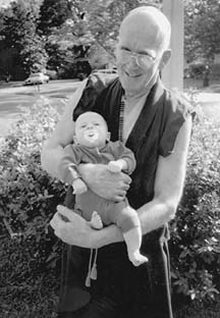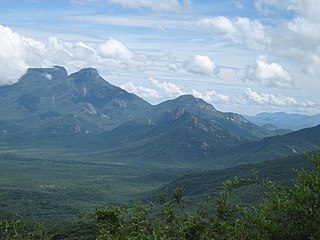The 1540s decade ran from January 1, 1540, to December 31, 1549.

Colin Macmillan Turnbull was a British-American anthropologist who came to public attention with the popular books The Forest People and The Mountain People, and one of the first anthropologists to work in the field of ethnomusicology.

Year 1545 (MDXLV) was a common year starting on Thursday of the Julian calendar.
Third gender or third sex is a concept in which individuals are categorized, either by themselves or by society, as neither man nor woman. It is also a social category present in societies that recognize three or more genders. The term third is usually understood to mean "other"; some anthropologists and sociologists have described fourth, fifth, and "some" genders.
The culture of Angola is influenced by the Portuguese. Portugal occupied the coastal enclave Luanda, and later also Benguela, since the 16th/17th centuries, and expanded into the territory of what is now Angola in the 19th/20th centuries, ruling it until 1975. Both countries share cultural aspects: language (Portuguese) and main religion. However, the Angolan culture is mostly native Bantu, which was mixed with Portuguese culture. The diverse ethnic communities with their own cultural traits, traditions and native languages or dialects include the Ovimbundu, Ambundu, Bakongo, Chokwe, Avambo and other peoples.

Huíla is a province of Angola. It has an area of 79,023 square kilometres (30,511 sq mi) and a population of 2,354,398. Lubango is the capital of the province. Basket-making is a significant industry in the province; many make baskets out of reeds.

Cumbia[ˈkumbja] is a folkloric genre and dance from Colombia.

The Kingdom of Kongo was a kingdom located in west central Africa in present-day northern Angola, the western portion of the Democratic Republic of the Congo, the Republic of the Congo as well as the southernmost part of Gabon. At its greatest extent it reached from the Atlantic Ocean in the west to the Kwango River in the east, and from the Congo River in the north to the Kwanza River in the south. The kingdom consisted of several core provinces ruled by the Manikongo, the Portuguese version of the Kongo title Mwene Kongo, meaning "lord or ruler of the Kongo kingdom", but its sphere of influence extended to neighbouring kingdoms, such as Ngoyo, Kakongo, Loango, Ndongo and Matamba, the latter two located in what is Angola today.

Dr. George Campbell Jr. was the eleventh President of The Cooper Union for the Advancement of Science and Art, from July 2000 to July 2011.
Gwebi'nkumbi was the 7th king of the Gcaleka sub-group of the Xhosa nation from 1902 until his death on the 30 May 1921. His father was King Sigcawu ka Sarili.
Daliza Sigcawu was the regent and 8th king of the Gcaleka sub-group of the Xhosa nation after his brother Salukaphathwa Gwebi'nkumbi Sigcawu died on 30 May 1921 until he handed over the reign to his nephew Mpisekhaya Ngangomhlaba Sigcawu in 1923 when he was old enough. His father was Sigcawu ka Sarili.
Mpisekhaya Ngangomhlaba Sigcawu was the 9th king of the Gcaleka sub-group of the Xhosa nation from 1923 to the 2 June 1933. His father was Salukaphathwa Gwebi'nkumbi Sigcawu.
Zwelidumile was the 10th King of the Gcaleka sub-group of the Xhosa nation of South Africa from 3 June 1933 to the 9 April 1965. He took over the reins when his oldest brother Mpisekhaya Ngangomhlaba Sigcawu died. He was born near Willowvale in the Cape Colony to Salukaphathwa Gwebi'nkumbi Sigcawu.
Diogo I Nkumbi a Mpudi was manikongo in 1545–1561. King Diogo was the grandson of king Afonso I of Kongo and won the throne after overthrowing his uncle Pedro Nkanga a Mvemba and forcing him to take refuge in a church in São Salvador. Diogo's early struggles are documented in a legal inquest he conducted in 1550 into a plot against him launched by the former king. In 1555, the king cut all ties with the Portuguese whom he saw as meddlesome and a threat to the kingdom and expelled all 70 Portuguese inhabitants from the kingdom.

Zanele Muholi HonFRPS is a South African artist and visual activist working in photography, video, and installation. Muholi's work focuses on race, gender and sexuality with a body of work looking at black lesbian, gay, transgender, and intersex individuals.
Angura Peter Tshirumbu Tsheehama (1941–2010) was a commander in the People's Liberation Army of Namibia, diplomat, Chief of Intelligence, and Namibian minister.
Diogo is a Portuguese masculine given name.





